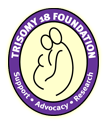The Cause
What is Trisomy 18?
Trisomy 18, also known as Edwards syndrome, is a condition which is caused by a error in cell division, known as meiotic disjunction. Trisomy 18 occurs in about 1 out of every 2500 pregnancies in the United States, about 1 in 6000 live births. The numbers of total births increase significantly when stillbirths are factored in that occur in the 2nd and 3rd trimesters of pregnancy.
Unlike Down syndrome, which also is caused by a chromosomal defect, the developmental issues caused by Trisomy 18 are associated with medical complications that are more potentially life-threatening in the early months and years of life. 50% of babies who are carried to term will be stillborn, with baby boys having higher stillbirth rate than baby girls.
At birth, intensive care admissions in Neonatal units are most common for infants with Trisomy 18. Again, baby boys will experience higher mortality rates in this neonatal period than baby girls, although those with higher birth weights do better across all categories.
Some children will be able to be discharged from the hospital with home nursing support for their families. And although less than 10 percent survive to their first birthdays, some children with Trisomy 18 can enjoy many years of life with their families, reaching milestones and being involved with their community. A small number of adults (usually girls) with Trisomy 18 have and are living into their twenties and thirties, although with significant developmental delays that do not allow them to live independently without assisted caregiving.
 100% of proceeds from Ayla’s 18 will go to the Trisomy 18’s Foundation. Please visit their website for more information about the Foundation.
100% of proceeds from Ayla’s 18 will go to the Trisomy 18’s Foundation. Please visit their website for more information about the Foundation.




